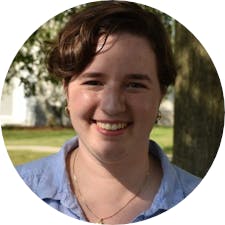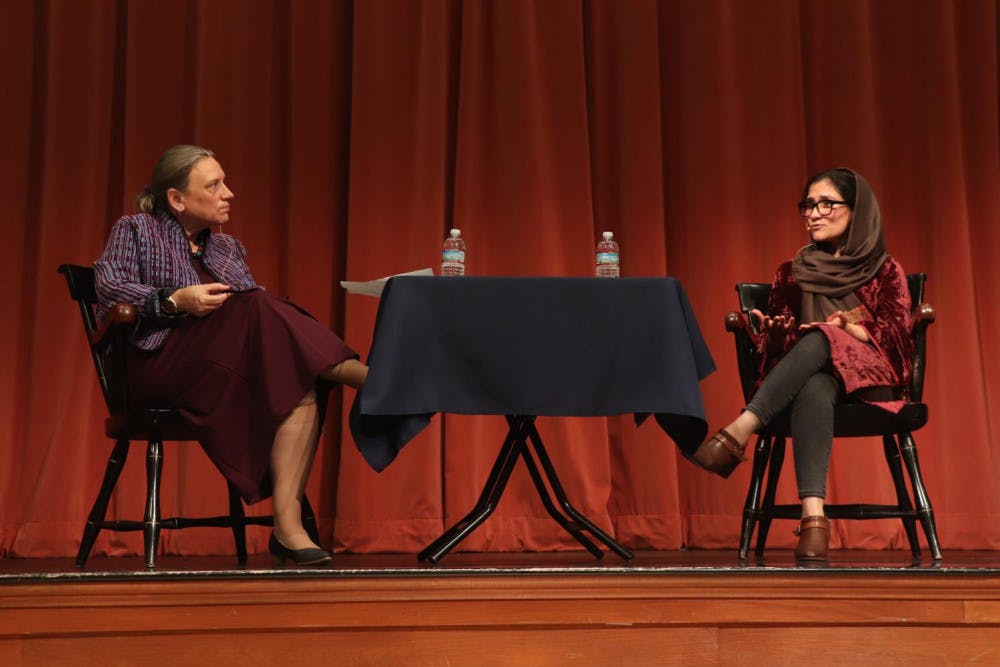“Come to the airport with a purse or backpack. You have 30 minutes,” Shabana Basij-Rasikh ’11 told nine graduates of the School of Leadership, Afghanistan (SOLA), the school she founded in 2008.
Of the school’s 95 current students, 92 accompanied Basij-Rasikh and those nine graduates to flee Afghanistan in August, just before the U.S. withdrawal and Taliban takeover. Soon, those nine will come to Middlebury to continue their college educations over the next four years, Basij-Rasikh announced in a Critical Conversations talk with President Laurie Patton on Saturday.
The students and teachers at SOLA, the first and only girls boarding school in Afghanistan, risked, in all likelihood, being targeted as the Taliban advanced toward Kabul. Their escape was cloaked in secrecy for their protection, but also for the good of those left behind. Basij-Rasikh knew what signal it would send to people if the only girls boarding school left Afghanistan. She didn’t want to destroy the hope of those who did not have a way out of the country.
Basij-Rasikh’s goal has always been to serve her country. She came to the U.S. for her last year of high school before enrolling at Middlebury. Between college classes that left her feeling overwhelmed and wildly out of place, she worked with an American retiree in Afghanistan to found SOLA in 2008. On weekends, she went on fundraising trips, somehow managing to balance her responsibilities back home with her women and gender studies and international studies homework.
Basij-Rasikh knows the value of an education. Born and raised in Taliban-controlled Kabul, she dressed as a boy and attended school in secret, since women were forbidden from receiving an education. But her parents were committed to her education.
"My father would say, 'You can lose everything you own in your life. Your money can be stolen. But the one thing that will always remain with you is what is in here.' And he would point to his head. 'Your education is the biggest investment in your life,' he would say. 'Don't ever regret it,’” Basij-Rasikh wrote on SOLA's website.
From a young age, her parents had drilled into her that the purpose of education was to serve people in need, and she was determined to return to Afghanistan to put hers to use.
“What troubled me the most was that girls, especially girls in Afghanistan, did not have access to quality education,” she said. “And I saw it as a responsibility, as a moral obligation, to do something about it.”
Basij-Rasikh returned to Afghanistan after graduating in 2011, the same year that the Obama Administration announced plans to withdraw from the country. People thought she was crazy for going back and starting a school in an active war zone and a seemingly-doomed country, but that did not deter her.
SOLA began as a high school, but it soon became apparent that the gaps in rural education before ninth grade made catch-up nearly impossible for many girls. The school admitted their first cohort of sixth grade girls in 2016 and have admitted a class every year since, steadily growing over time. The girls come from all over the country and all different ethnic groups, representing 28 of the 34 provinces.
One purpose of the school is to address years of ethnic tension and violence in the country by pairing girls with roommates and mentors from different ethnic groups and encouraging intermingling. It was always Basij-Rasikh’s hope that the school would one day host students from every province so the girls would return home and teach their communities what they had learned about tolerance.
Many students attend the school for free, but those who can make a symbolic contribution to the cost as a way of ensuring their commitment to their daughter’s education.
“It comes, unfortunately, as a surprise for a lot of American audiences when I say that families across Afghanistan crave great educational opportunities for their children,” Basij-Rasikh said. “At the end of the day there are so many things universal about parenting, including wanting great opportunities for your children.”
Basij-Rasikh recalled one father coming to her to pay his daughter’s school fee. He pulled out a carefully tied handkerchief from his pocket, filled with small bills he’d painstakingly collected throughout the year for his contribution by waiting on the corner of the street each morning to be hired for his day job.
“I had this feeling of wanting to return the money to him, but I knew I would shatter his pride; I couldn't do that,” she said. “His daughter is the first person — not the first woman but the first person — in his family to receive an education. . . he knew very deeply the importance of his daughter's education.”
The first cohort of sixth graders that matriculated in 2016 was in 11th grade and would have graduated in 2022, a year Basij-Rasikh could not mention without tearing up at the thought of what could have been.
When Biden announced on April 14 that U.S. troops would withdraw from Afghanistan by Sept. 11, Basij-Rasikh knew that a Taliban takeover was only a matter of time. She knew, too, that her work at SOLA put her, and all of the other staff members, teachers and their families at risk.
By mid-July, the Taliban advance already endangered the lives of SOLA’s students. In an opinion piece published in the Washington Post, Basij-Rasikh wrote about two girls whose grandmother handed them scythes and told them to prepare themselves.
“She told them that if Taliban fighters ever came to the house, the girls must be swift. There would be no time to hesitate,” Basij-Rasikh wrote. “If the Taliban comes into this house, she said, use these scythes to kill yourselves. The girls promised that they would.”
Basij-Rasikh burnt the academic records of all of her students, not to erase them, but to protect them and their families. She knew she couldn’t stay in Afghanistan, but she also couldn’t abandon her students and ask them to forfeit the futures they had spent all these years building against all odds.
After approaching many neighboring countries for help, they decided to take the president of Rwanda’s offer to host a study abroad semester in Kigali, the capital. She didn’t know if the families would trust her with their daughters, but almost all of them did.
“The majority of these families couldn’t put Rwanda on the map. Some of them didn't even know how to pronounce the country, but they sent their daughters,” she said. “I don't know if I would make the same kind of decision, I don't know if you would make that kind of decision. When there's war, when there's so much more increased uncertainty, how do you let one of your children go?”
Soon it became apparent that they would have to be there for more than the semester. On Sept. 17, the Taliban announced that high schools across the country could reopen for boys only, effectively banning girls from secondary education.
“If there is one group that understands the value of girls’ education more than any one of us, it is the terrorists,” Basij-Rasikh said. “They are so fixated on preventing girls from accessing education. And I wish our policy makers and influencers of the world understood this as much as they do because we wouldn't be where we are today.”
For now, Basij-Rasikh has had to give up her dream of graduating the first cohort of students from SOLA in 2022, realizing that pushing forward with that goal would be selfish given the circumstances. Instead, SOLA is sending 42 students to boarding schools across the U.S.
The remaining students will continue at SOLA’s new Kigali campus, and the school plans to fill the open spots with young, female refugees without access to education until the day they can return to Afghanistan. The space in Kigali is actually larger than the school in Afghanistan, so SOLA will be able to take in double their earlier population.
Rwanda, as a post-genocidal society, offers a unique hope to the students and opportunities to learn about forgiveness, reconciliation and how to build back a country from violence and destruction. The Rwandan government has also given the school two nurses and two doctors for around-the-clock care and access to trauma counselors.
Basij-Rasikh has not given up hope, and eagerly awaits the day she and SOLA can return to Afghanistan, her home and the country to which she has dedicated her life.

Sophia McDermott-Hughes ’23.5 (they/them) is an editor at large.
They previously served as a news editor and senior news writer.
McDermott-Hughes is a joint Arabic and anthropology and Arabic major.
Over the summer, they worked as a general assignment reporter at Morocco World News, the main English-language paper in Morocco.
In the summer of 2021 they reported for statewide digital newspaper VTDigger, focusing on issues relating to migrant workers and immigration.
In 2018 and 2019, McDermott-Hughes worked as a reporter on the Since Parkland Project, a partnership with the Trace and the Miami Herald, which chronicled the lives of the more than 1,200 children killed by gun violence in the United States in the year since the Marjory Stoneman Douglas High School shooting in Florida.




